Beijing: Nothing left to chance
How China has pulled out the stops in pursuit of the Olympic dream.
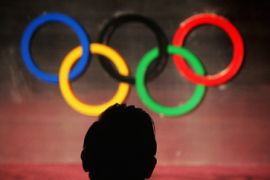
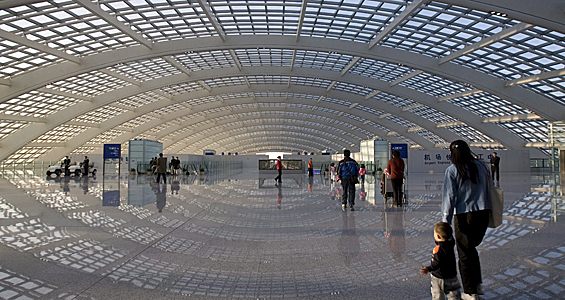 |
| Beijing airport’s new Terminal Three epitomises the shiny new capital [EPA] |
Beijing has been put on loan to the international sporting community.
Days from now, the 2008 Olympics will begin in China’s capital, and here is how competitors and visitors will see the city, because this is how they are meant to see the city.
The brand new, state-of-the-art Terminal Three at Beijing’s international airport will be the first port of call.
| Seddon’s Diplomatic diary |
|
Part 1: Spain finds her voice in victory Part 2: Sarkozy reaches for the stars |
Clean, spacious, efficient, the opening of this vast new hub went, apparently, without a hitch.
Chinese officials, including my old friend Zhang Zhijun, now a vice minister, are too polite to make jokes, but they do make gentle comparisons with the shambles that accompanied the opening of London Heathrow’s Terminal Five.
A new expressway, fairly clear of traffic, will take visitors direct to the heart of this vast city.
Taxis will sweep past broad vistas and boulevards, tall buildings and neon lights, the eponymous McDonalds restaurants, and many Beijing residents riding their bicycles.
Everywhere is the slogan “Beijing 2008, One World, One Dream”, although tickets for the Olympic events have been reportedly hard to come by.
Tiananmen memories
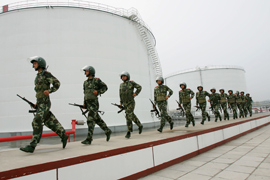 |
| Paramilitary police move into position at an anti-terror drill [GALLO/GETTY] |
Tiananmen Square, in the heart of the city and the centre of the 1989 student protests that rocked the Chinese Communist Party, is also taking part in the national Olympic celebrations.
Red flags are everywhere and on either side of the square, giant Chinese gardens, advertising the Olympics, which have become a major tourist attraction.
But on closer inspection, nothing is being left to chance.
All entry points to the square are policed and airport-style security devices are in place so that every carried item is checked before entry.
Beijing’s most famous square is off-limits to anyone, from within or without, who might hope to raise the Tibetan flag or any other demonstration.
However, in an echo of London’s Speakers Corner, there have been reports that the Chinese authorities may be willing to allow a “protest corner” at desginated zones in the city – strictly controlled of course.
Hazy explanation
The infamous Beijing smog still hangs listessly over the city, although the China Daily newspaper would like to point out that this is not pollution, but ‘haze’.
Pollution levels have in recent weeks on occasion reached danger level, but enormous effort has been devoted to reducing vehicle emissions and huge numbers of smokestack industries have simply shut up shop for the duration of the games.
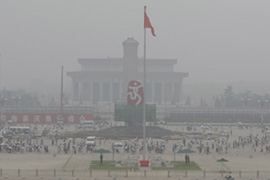 |
| Smog or ‘haze’ surrounds Tiananmen Square [Reuters] |
Yesterday, for a few hours, the grey lifted and just a hint of the blue sky beyond could be seen.
The throat-gagging toxic cocktail of petrochemicals and coal smoke that I experienced three years ago, has largely disappeared.
The old Beijing has almost, but not quite, disappeared as well.
As the high rises marched into the city, the old areas of the communal Houtong district with its single-storey houses have disappeared beneath the bulldozers.
Whole districts simply vanished as residents were moved to new tower blocks with running water and electricity.
But just behind my hotel, hidden now behind a newly erected wall, advertising – of course – the Olympic Games, is a small sliver of traditional housing that has somehow survived China’s onward march.
Here, it is still possible to see how most city dwellers used to live, and to wonder at some of those romantics who wanted to preserve it all.
Transformation
Perhaps it is the traffic-calming measures, the vigilance of the police in making sure that beggars do not take up their usual pitches in the underpasses, or maybe even the sheer cleanliness of the city, but it doesn’t seem to be as busy as it should be.
The rumour is that the hotels aren’t as booked up as expected – a combination of overzealous visa application rules, as well, it is claimed by some, Western protests over Tibet.
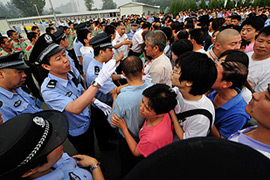 |
| The response to the sale of Olympic tickets has been overwhelming [AFP] |
Perhaps this won’t matter, because enough visitors will come to Beijing and experience some of what this city has to offer.
For this is a city and a country in the midst of fundamental economic and social change, a great leap forward that mirrors in a different way the transformation of China from an agrarian society to an industrial one, albeit without the huge suffering of that earlier time.
Minister Zhang tells me that “86% of the Chinese people are optimistic about the future”, and I am inclined to believe him.
The other China, the China beyond the coast and the cities may still be poor, but the speed of transformation of this country is breathtaking.
And the Olympic games provides China with a wonderful opportunity to showcase both its shiny new capital and its growing confidence.
Party in charge
The Marxist-Leninism of the past has given way to Market-Leninism.
The Communist Party remains very much in charge, an adminstrative and control organisation that party officials believe holds the country together and prevents it fracturing like the former Soviet Union.
Today the market is king.
Providing its central authority is not challenged directly, it is possible to hold many views or opinions in modern-day China.
Which makes China and Beijing an altogether very different proposition to where I will be travelling and reporting from next – North Korea, the hard-line Communist state that reminds so many Chinese of their own country 40 years ago.